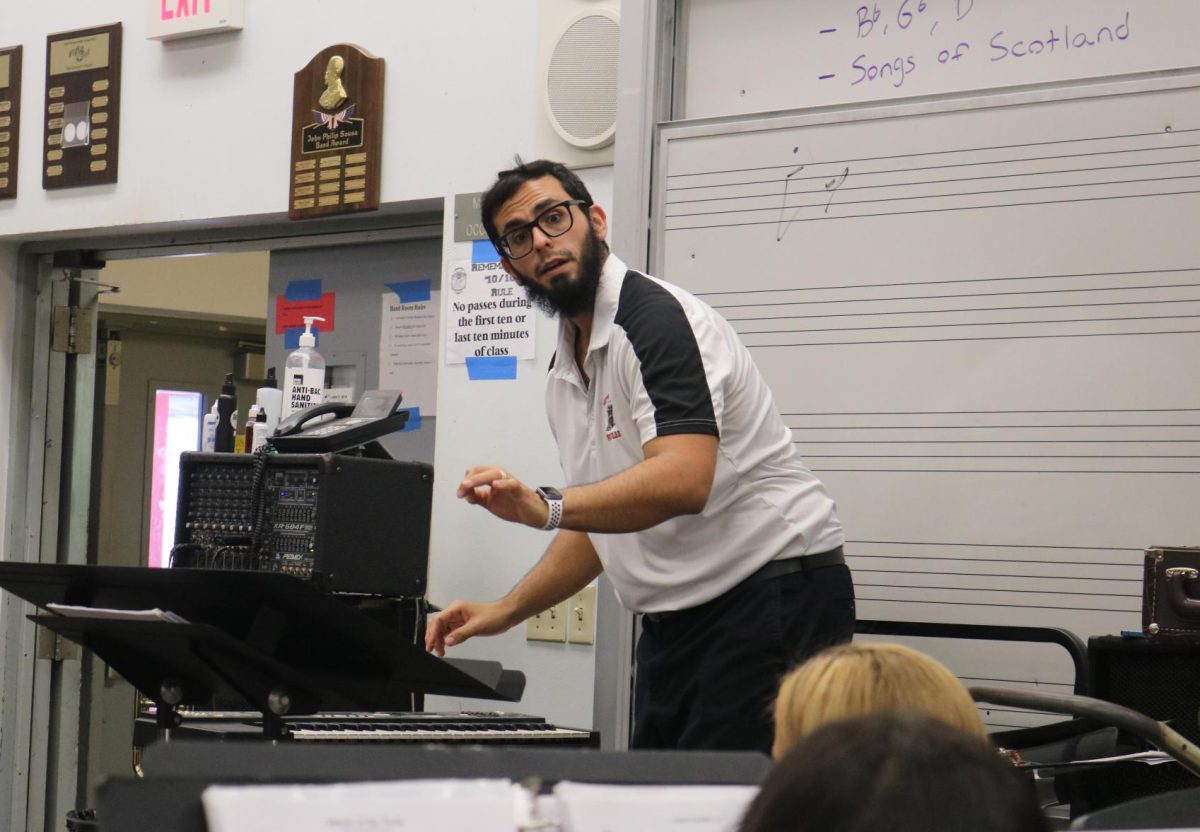A South Broward High School junior is speaking against proposed cuts to advanced academic programs that have helped fast-track her college education. Alya Kayan has taken nine AICE classes, five dual enrollment courses, and an AP chemistry class during her high school career. With Florida lawmakers passing the HB 5101 bill, which would cut funds by 50% for Advanced placement, AICE, Dual Enrollment, and Career Technical Education courses statewide.Students like Ayla are worried about losing access to these valuable opportunities.
Ayla explains the financial benefits of taking these courses now rather than in college.
“It’s much cheaper taking these classes in high school than in college,” Ayla says. “A single college course can cost $2,000, but right now I only pay around $100 for an AP or AICE exam.” If the bill passes and schools stop covering exam fees, some students might not be able to afford these advanced courses.
SBHS CTE engineering teacher Kevin Hagerty, argues that these rigorous school programs help students challenge themselves, while also improving academically using hands-on tools.
“These advanced courses challenge students with higher expectations,” explained Mr. Hagerty. “With more rigor comes more results. They provide students with opportunities to excel–both academically and personally.”
For many SBHS students who are aiming for college scholarships, career certifications, and academic advancement which provides students with career experience and hands-on education, these programs are major lifelines for them.
SBHS junior Thiago Barrios had no idea about the HB 5101 bill and wasn’t happy after finding out that the classes he wanted to take might be affected by the cuts. “There’s a lot of students here at South Broward that are really capable, but due to circumstances, they aren’t able to get as many opportunities as other students in more financially stable areas,” said Barrios.
For students like Kayan these programs have already helped her make significant progress toward her future. Her AICE diploma will qualify her for full Bright Futures tuition coverage, and her accumulated credits mean she can start at Broward College as a senior next year, saving her family more than $2,500 in tuition costs. “These classes help me push my limits and learn time management,” she says. “I’ll be working less hard in college because I’ve already gotten so much done.”
Licensing for an online platform, exam fees, field trips, and classroom appliances all rely on these state fundings to keep the programs running. These programs are expensive. Schools receive around $85 per student who passes an AP, AICE or IB exam, while CTE courses receive $1,622 per student who completes a full certification course.
“We use the funding for audiovisual aids, hands-on materials, updated textbooks, and crucially, testing resources,” said Mr. Hagerty. “We rely on platforms like Learning.com and EverFi, which help prepare students for digital literacy and financial education.”
Funding plays a crucial role in making these programs possible, financial resources are used to keep students engaged in the courses provided to them. Mr. Anthony Baldocchi a SBHS teacher who has been teaching for five year, teaches health science; anatomy & physiology, health science foundation, and applied health care. Baldocchi believes if there is a 50% cut in funding for these programs it will be difficult affording tests and equipment for students.
“These programs can lead to future success for students in the healthcare profession, cutting the funding can prevent students from getting a step ahead in their future goals,” said Baldocchi.
Principal Alex Francois said that even with these cuts the school will do its best to continue fighting but these cuts might cause further complications as CTE and AICE are the main advancement in South Broward. Francois explained that much of the current budgets for programs like AICE Cambridge, are already allocated for educator stipends, testing costs, and materials. In 2024 alone, South Broward had spent over $25,000 on AICE exam fees alone.
“I would say the real impact would be more with teacher bonuses and also the funds that schools received from students successfully passing those exams,” said Francois.
This bill has raised many questions on where the state’s education priorities are.
Certifications from CTE courses as well as AP and AICE courses, like Early Childhood, Marketing Management, AP Art, AP Statistics, and AICE English language aren’t just resume boosters–they open doors of opportunities to students.
“Students can use them to get internships, part-time jobs, and even full-time roles after graduation,” Mr.Hagerty said. “Last year, we had 45 students take certification exams, and 38 passed—that’s about 84%.”
For programs like CTE and Dual Enrollment, cutting funds could deviate points of these free courses. Without the materials, proper licensing, and software applications these programs are bound to fail.
“The biggest impact would probably be in the area of online resources and software programs that require licensing fees to use,” said Mr. Hagerty. “Today’s education is largely done through a lot of online resources, and it’s imperative that we have the funds to keep those available to our students.”
The HB 5101 bill is a controversial legalization, Principal Francois hopes that there is a bigger picture for the new bill, hoping that the cut funds would be invested in better teacher salaries.
“I think if they are allocating this money correctly, I think it should go back to paying for our teachers because I think teachers definitely need to be supported financially,” said Francois. “I know my wife’s a teacher and I know it’s rough when it comes to paying teachers and living in South Florida is expensive.”
Despite financial uncertainty, the passion remains to educate students as many teachers still take a chance to provide a better education for them.
“Even if funding cuts into my supplemental salary, I’d still teach these courses. I’m here for the students. But let’s be honest—teachers also need to make a living.” said Mr. Hagerty.
As the debate over HB 5101 continues, students across Florida are watching closely, hoping lawmakers will consider how these cuts could affect their educational opportunities and future success.
“You get what you pay for. If we want students to thrive in tomorrow’s economy, we have to invest in them today.” Mr. Hagerty said.










